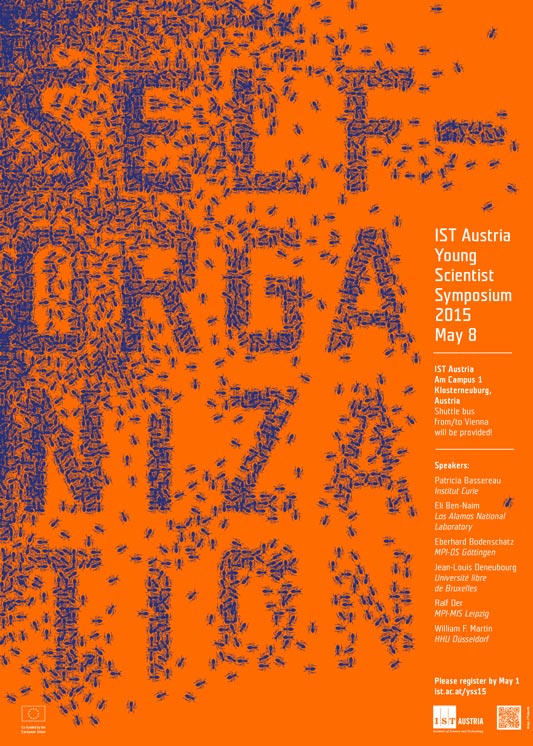April 20, 2015
When the whole is more than the sum of its parts
Young scientists at IST Austria self-organize symposium on self-organization • Event on 8 May open to scientists and the general public

Self-organization is observed in a great variety of systems both in the animate and inanimate nature and in the abstract world of mathematics. PhD students and postdocs at the Institute of Science and Technology Austria (IST Austria) have chosen “Self-organization” as the topic of the Young Scientist Symposium (YSS) taking place on May 8, 2015. Like the four similar events since 2012, this one-day symposium is independently organized by the young scientists and will gather international speakers from a broad range of research areas.
In a large assembly of individuals or objects, self-organization can lead to complex, surprising, and beautiful patterns at the group level. These patterns are not created by an external force that tells all agents what to do but arise by themselves as each single agent follows simple rules and interact directly or indirectly with its fellow agents. By self-organization, the system as a whole acquires properties that none of the objects or individuals possess on their own. That is, the whole is more than the sum of its parts. Instances of self-organization are diverse and range from fluid dynamics or molecular self-assembly (leading to the “origins of life”) in the microscopic world to macroscopic phenomena such as collective behavior of insects or the formation of sand dunes. Moreover, understanding self-organizatory mechanisms has tangible applications, e.g. in designing robotic systems and in the analysis of traffic jams.
In six talks, the speakers of the YSS 2015 will cover several phenomena of self-organization and methods for studying them, followed by a panel discussion. Patricia Bassereau (Institut Curie, Paris) and William F. Martin (Heinrich-Heine-Universität, Düsseldorf) will inform the audience about recent advances in understanding self-organizatory mechanisms in biomembranes and in evolution including questions on the origins of life. Jean-Louis Deneubourg (Université Libre de Bruxelles) and Ralf Der (MPI for Mathematics in the Sciences, Leipzig) will cover topics connected to the collective behavior of insect societies and behavioral self-organization of robots. Representing the field of physics, Eli Ben-Naim (Los Alamos National Laboratory, USA) and Eberhard Bodenschatz (MPI for Dynamics and Self-Organization, Göttingen) will provide insight into their work which ranges from chemical polymerization and turbulent fluids to modeling traffic flow and earthquake interactions.
The multidisciplinary nature of the event reflects the multidisciplinarity of IST Austria, where researchers of very different research fields work door to door to each other. In the spirit of IST, the Young Scientist Symposium aims at bringing together researchers from very diverse disciplines to foster mutual inspiration and a broad view on the topic of self-organization. The organizing committee itself consists of eleven PhD students and postdocs from six different research groups and seven different countries.
The event is free of charge and open to academics at all stages of their career as well as to anybody else interested in the topic. The organizers expect 140 participants from Vienna, Austria and beyond.



